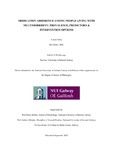| dc.description.abstract | Background. Multimorbidity refers to the presence of multiple chronic conditions in an
individual person. The prevalence of multimorbidity is increasing globally, presenting a
significant challenge for healthcare systems and many individuals. Multimorbidity adds
complexity to the clinical- and self-management of illness, including the use of medicines.
Medication adherence refers to taking medicines as agreed with a healthcare provider. Non adherence has been described extensively in the literature; however, the focus has largely
been on single-condition populations. Multimorbidity is the norm in clinical practice, and
may influence the beliefs and behaviours relevant to taking medicines. An evidence base
outlining medication non-adherence in this population is therefore needed.
Aims. This thesis aimed to (1) synthesise the reported prevalence and predictors of
medication non-adherence among people living with multimorbidity, (2) qualitatively explore
the experiences of people taking medicines for multiple co-occurring conditions, (3)
quantitatively examine theoretical correlates of non-adherence in this cohort, and (4)
systematically identify options for a behaviour change intervention to support adherence to
medications prescribed for multimorbidity.
Methods. Four studies were conducted to address the aims of this thesis. Study 1 involved a
systematic review and meta-analysis to synthesise the existing quantitative evidence reporting
the prevalence and predictors of non-adherence to medications among people living with
multimorbidity. Study 2 used thematic analysis to explore the experiences and perceptions of
taking medicines for multimorbidity, using data derived from semi-structured interviews with
16 people recruited in general practice. Study 3 involved a quantitative secondary data
analysis using polynomial regression to examine the multidimensional relationship between
medication beliefs and adherence in a general practice cohort of 812 people living with
multimorbidity. Study 4 applied the Behaviour Change Wheel to select options for a
behavioural intervention to support adherence to medications, using the evidence produced in
the preceding studies and the wider literature. A panel of Public and Patient Involvement
contributors were engaged with throughout the programme of research.
Findings. The prevalence of non-adherence among people living with multimorbidity was
estimated to be approximately 43% in a meta-analysis of eight studies. Treatment- and
illness-related beliefs, memory performance, and the quality of relationships with healthcare
providers were among the reported correlates of non-adherence. Several reviewed studies suggested that adherence could differ between conditions within individuals living with
multimorbidity. Findings from the qualitative study highlighted that multimorbidity can
produce an amplified burden for some people, who seek to relieve this burden through
resignation to their need for medications, prioritisation among conditions, and use of supports
such as memory aids. These strategies may influence adherence to varying extents, for
example prioritisation may lead to disparities in adherence across conditions, while
resignation may lead to better adherence but enduring concerns about medicines. The
polynomial regression analysis supported this assertion, as people who believed in the
necessity of medicines while also having concerns were more adherent than those who did
not believe medicines were necessary and who had no concerns. These findings together
highlight the complex beliefs and behaviours experienced by some people living with
multimorbidity. The identification of intervention options using the Behaviour Change Wheel
attempts address this complexity by targeting both perceptual and practical barriers to
adherence using cognitive- and behaviourally-focussed techniques.
Conclusions. This thesis applied multiple methods to understand and describe adherence to
prescribed medications in the context of multimorbidity. Through a synthesis of the available
evidence on prevalence and predictors, a qualitative exploration of individual experiences and
perceptions, a quantitative examination of a multidimensional theory, and application of the
resultant evidence to select options for a behaviour change intervention, the research reported
here contributes to the literature on a key behaviour in a prevalent population. By focussing
on multimorbidity, the findings from this thesis offer important implications for intervention
development, health psychology, and healthcare more broadly. | en_IE |


